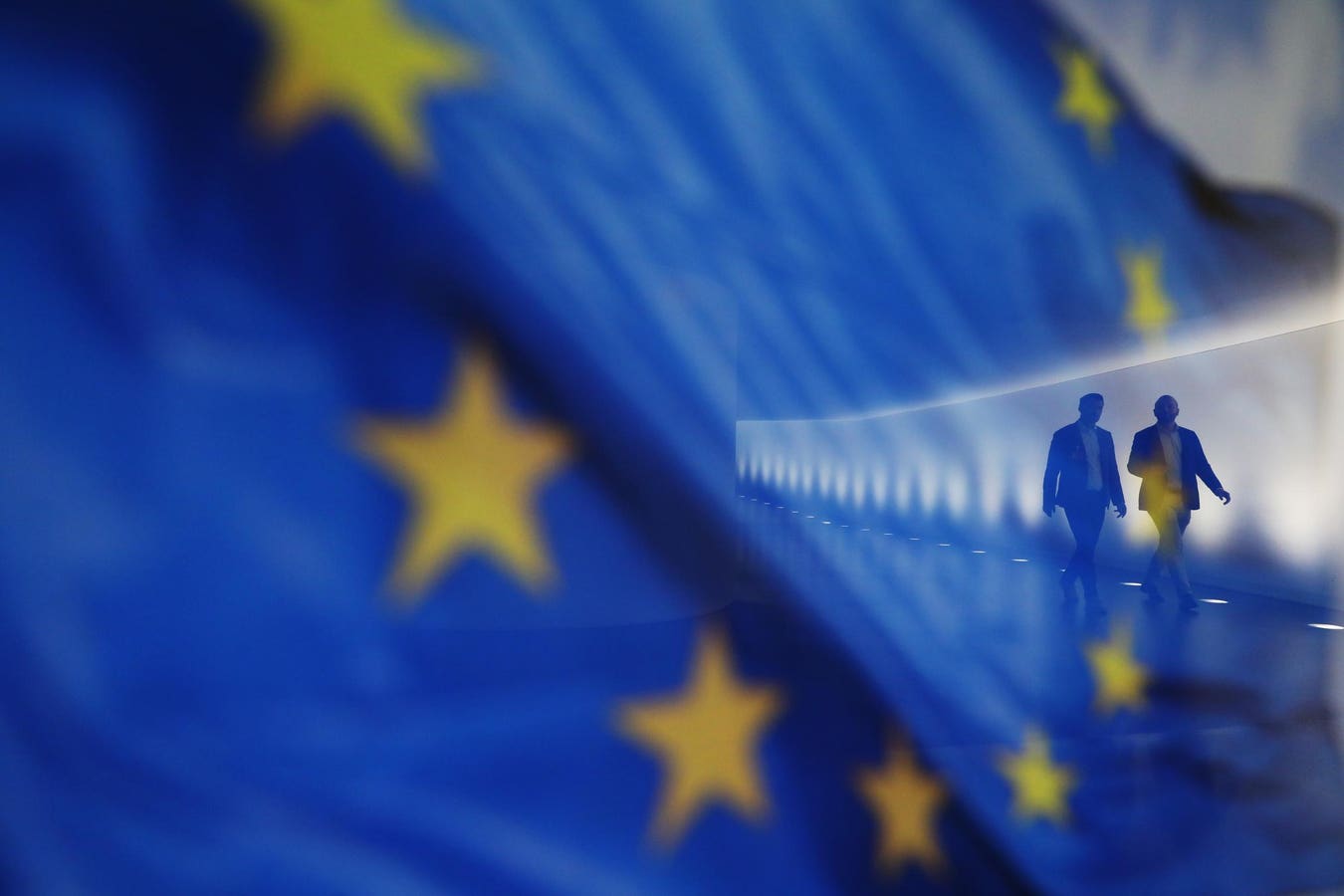
People walk by a European Union flag (Photo by Michele Tantussi/Getty Images)
Getty Images
The European Parliament is debating legislation to reduce sustainability reporting requirements in the European Union. The original proposal of the European Commission included a drastic reduction of the scope of a pair of sustainability reporting directives. The member leading the drafting of the Parliament’s has released his draft proposal, calling for even more cuts, alarming sustainability activists and emboldening business interests. That proposal was debated in the June 24 meeting of the Committee on Legal Affairs, known as JURI.
As part of the European Green Deal, a trilogy of directives were passed by the EU to force businesses to address climate change and report greenhouse gas missions. However, the cost of these proposals on businesses and the broader impact on the EU economy became a theme during the 2024 elections. The shift to the right in EU politics embolden opponents. As a result, the Commission proposed a package of new directives to “reduce the burden” on businesses.
The Omnibus Simplification Package was officially adopted by the Commission in February. The proposal is being debated in the Council and the Parliament. In the Parliament, the debate is public and working through multiple committees, giving interest parties and MEPs the opportunity to voice their opinions.
JURI, is the primary committee that will produce the legislation that will be sent to the full Parliament for a vote. MEP Jörgen Warborn, of the European People’s Party, has been designated as the rapporteur to lead the drafting of the final legislation.
Warborn’s draft report was made public on June 6. The draft includes 82 proposed amendments. During the June 24 JURI meeting, the Committee addressed the proposed amendments. Warburn was given the opportunity to share his initial proposal and the shadow rapporteurs gave initial comments.
Jörgen Warborn
European Parliament
Warburn stated the EPP’s goal in the proposal. “We would like to go further in cutting costs, because we need to strengthen European competitiveness in order to create long-term prosperity for European citizens.”
To justify the need for cuts, he stated “sustainability rests on three pillars: the environmental pillar, the social pillar, and the economic pillar… if one breaks, the stretcher collapses.”
He then outlined his 10 key priorities in the proposal:
- Common threshold of 3000 employees and 450 million in net turnover for the CSRD and the CSDDD.
- Delete mandatory climate transition plans, making them voluntary under the CSRD and completely eliminated from the CSDDD.
- Keep tier 1 in CSDDD, with clearer language focusing on direct business partners and strengthening the risk-based approach.
- A subsidiary exemption under the CSRD for businesses where the parent company is already reporting.
- Expand the harmonisation clause to prevent “gold plating”, or actions by member states that raise the standards beyond what is directed by the EU.
- Align the terminology of the CSRD and CSDDD when it comes to the value chain, using the phrase “chain of activities.”
- To protect SMEs from being forced to report, he wants to “make the SME shield work in practice” by limiting the data large companies can demand for companies that not required to report under the CSRD.
- Strengthen the protection of trade secrets.
- Increase flexibility relating to contract suspension that is required under the CSDDD if a business in the chain of activities is not in compliance.
- Set a clear date with limited assurance standards.
MEP Lara Wolters, Group of the Progressive Alliance of Socialists and Democrats
European Parliament
Lara Wolters, of the Group of the Progressive Alliance of Socialists and Democrats (S&D), stated her group felt the “Commission proposal was extremely rushed and deeply flawed.” She says that the proposal is not focused on removing the administrative burden, rather on removing accountability. She did not get into the specifics of the S&D proposal, but gave a vigorous counterargument to reductions.
Countering the EPP’s push to lower costs on businesses, she stated that she “is not inspired by this… It is our job to weigh public versus private interests. But if costs are all the EPP cares about at the moment, then at least let us be honest that the costs are merely being displaced. Costs reduced for companies here are costs that the world will need to shoulder anyway. Climate denial comes at a cost. So does environmental degradation, exploitation, and inequality. So does feeding populism.”
MEP Pascal Canfin, The Renew Group
Euroepan Parliament
Pascal Canfin, of the Renew Europe Group, stated that he agrees with the EPP on the auditing of the CSRD report. He believes there is room to negotiation on that topic and reduce cost beyond the Commission proposal.
He stated that he agrees in cost reduction, but that the EPP proposal does not deliver that. Focusing on capital market union, he said investors need data. The reduction in of the CSRD may save costs on paper, but will increase costs in the long term as investors spend more to gather the data. He will be offering amendments to address those concerns.
Renew will also present amendments to address the single market approach and what he views as conflict with the restriction on civil liability causing market fragmentation. He also took issue with the application of the 3000 employee threshold to non-EU companies, claiming that would exempt nearly all non-EU companies from the scope. Interestingly, he stated the calculation of the employee count for non-EU companies is not based on total employees in the EU, rather total employees in a member state.
MEP Kira Marie Peter-Hansen, Group of the Greens/ European Free Alliance (EFA)
European Parliament
Kira Peter-Hansen, of the Group of the Greens/ European Free Alliance (EFA), stated that they agree with simplification and “reporting must be both meaningful and manageable.” However, she agrees with the S&D that the Omnibus and the EPP proposals go beyond simplification into deregulation. She pointed out that the raised thresholds not only eliminate 80% of the companies, but also some member states as they do not have any companies large enough to comply.
She encouraged the use of the EFRAG data to simplify the data points in the European Sustainability Reporting Standards to simplify reporting requirements without “weakening impact.”
She accused the EPP of “choosing populistic, symbolic changes over actual needed changes that would benefit from a revision.” Further, she stated that “removing climate transition plans completely is not just wrong, it is irresponsible.”
She encouraged the adoption of a risk-based approach over the Commission proposal of mapping the value chain, claiming it would increase costs for companies. Finally, she objected to the removal of civil liability in the CSDDD.
MEP Arash Saeidi, The Left Group
Euroepan Parliament
Arash Saeidi, of The Left, opened by stated that “there are men, women, and children whose rights are being breached and they’re just being seen as cogs in the wheel of a production – modern slavery, textiles workers, forced labor to produce our electronics.. workers killed on sites. The CSDDD is designed to put an end to impunity and finally holding companies legally accountable from environmental damage and infringement of human rights.”
He stated that The Left will present a proposal to reject all the proposed changes and stay with the existing text in the CSRD and CSDDD.
Political parties and MEP had until June 27 to submit amendments. On July 15, the shadow rapporteurs will meet to discus the amendments and begin negotiations. To pass, the proposal needs majority support.
Committee opinions are being drafted by Economic and Monetary Affairs, known as ECON, Environment, Climate and Food Safety, known as ENVI, Foreign Affairs, known as AFET, International Trade, known as INTA, and Employment and Social Affairs, known as EMPL. Those will be sent to JURI for consideration.
I suspect Warborn’s proposal is a negotiation tactic. By promoting a position that is more extreme than the original Commission proposal, the EPP has room to negotiate. However, the recent proposal by the Council was also to the right of the Commission. The final Parliament proposal may end up being the middle ground.
JURI is expected to adopt the final language to reduce the Corporate Sustainability Reporting Directive and the Corporate Sustainability Due Diligence Directive on October 13. Following the vote of the Parliament, designated representatives from the Parliament, Council, and Commission will enter into “trilogue” negotiations. The proposals from each of the three bodies will vary. The trilogue will negotiate the differences to produce a final directive. That directive will be sent to the Council and Parliament for a final vote in December or January.
